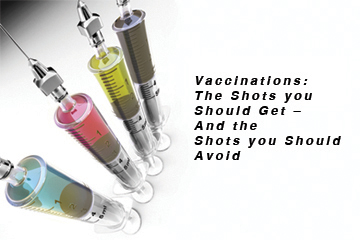HOME
PAST DIGITAL ISSUES
HIV/AIDS HOTLINES
HIV 101
POSITIVE PROFILES
ASO SPOTLIGHT
RECENT ARTICLES
HOW TO PAY FOR HIV TREATMENT AND MEDICATIONS
ADAP CRITERIA AND FORMULARIES
ASO LISTINGS
REVIEW OF HIV MEDICATIONS
2018 HIV/AIDS FUNDRAISING ACTIVITIES & EVENTS
ABOUT HIV POSITIVE! MAGAZINE
LINKS
SUBSCRIBE
CONTACT US
ADVERTISER INFORMATION
The Shots you Should Get Ė
And the Shots you Should Avoid
 When you have HIV, your immune system is weakened, making you susceptible to infection. Because of this, several vaccinations, or immunizations, are recommended for people living with HIV.
When you have HIV, your immune system is weakened, making you susceptible to infection. Because of this, several vaccinations, or immunizations, are recommended for people living with HIV.
Vaccinations are most effective when your CD4 (T-cell) count is greater than 200 cells per microliter of blood. If your T-cell count is lower than 200, your doctor will probably recommend that you go on HIV medications and wait until your T-cell count comes up.
In general, live vaccines are not recommended for people living with HIV, especially those with low T-cell counts. Live viral vaccines (containing a weakened version of the live virus), such as small pox or varicella (chickenpox), are only given to HIV patients if the health benefits clearly outweigh the risks. This is because live viral vaccines can sometimes infect a person with a compromised immune system.
Shots You Should Get
Polysaccharide pneumococcal (pneumonia)
You should get the polysaccharide pneumococcal vaccine shortly after you are diagnosed with HIV, unless you have been previously vaccinated within the last five years. The vaccine protects against 23 of the most common types of pneumococcal bacteria that cause pneumonia. You typically get one or two shots every five years.
Pneumonia is a bacterial infection which causes inflammation of the lungs. The Streptococcus pneumoniae bacterium commonly causes the illness. Pneumonia can range from mild to severe, depending on the bacteria that causes it and your overall health. The pneumonia shot is important because people living with HIV have an increased risk of developing severe pneumonia, which can be fatal.
Hepatitis B virus (HBV)
Experts recommend that all HIV patients get the hepatitis B virus vaccine, unless there is evidence of immunity or active hepatitis. You get a series of three shots over the course of six months. The second dose is given at least one month after the first dose. The final dose is given at least two months after the second dose and at least four months after the first dose. All three doses are needed for the most effective and longest-lasting immunity.
Hepatitis B causes liver infection. The infection can become chronic in some people and lead to liver failure, liver cancer, cirrhosis (permanent scarring and damage of the liver) or death. When liver damage is severe, a liver transplant may be the only option.
Influenza (flu)
People living with HIV should get an annual influenza (flu) vaccination. Only injectable flu vaccines should be used on people with HIV because they are not live vaccines. Donít get the nasal spray vaccine, FluMist, because it contains a weakened form of the live flu virus.
Getting your annual flu shot is very important. People with HIV who catch the flu have an increased risk of developing serious flu-related complications (like pneumonia), and are more likely to die from the infection than people who are not infected with HIV. Also, flu symptoms tend to last longer in people with HIV. Get your flu shot by mid-November, before the flu season kicks in.
Measles, mumps and rubella (MMR)
The only live vaccine recommended for HIV-positive people is the measles, mumps and rubella (MMR) vaccine. People born before 1957 do not need this shot because they lived through several years of the measles epidemic, before the first measles vaccine was developed, and 95-98% of them are immune to measles.
Measles, mumps and rubella are highly contagious viral infections. Fortunately, they are rare in the United States, where MMR vaccinations are routine. Measles, mumps and rubella are transmitted through airborne droplets.
Tetanus and diphtheria toxoid (Td)
Tetanus and diphtheria toxoid (Td) vaccinations are recommended for all HIV patients to prevent tetanus (lockjaw) and diphtheria (contagious infection of the throat). The two vaccines are always administered together.
Shots You Should Avoid
Anthrax, smallpox, varicella (chicken pox) and varicella-zoster (shingles) vaccines are not recommended for people living with HIV. The smallpox and varicella vaccines are live viral vaccines, which can infect the vaccine recipient and may even sometimes infect those who come into close contact with a recently vaccinated person. Although the anthrax vaccine is not a live vaccine, it is not considered to be necessary because anthrax does not pose an increased risk to people living with HIV.
Copyright 2018, Positive Health Publications, Inc.
This magazine is intended to enhance your relationship with your doctor - not replace it! Medical treatments and products should always be discussed with a licensed physician who has experience treating HIV and AIDS!